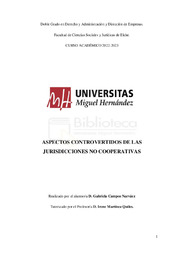Por favor, use este identificador para citar o enlazar este ítem:
https://hdl.handle.net/11000/29903Registro completo de metadatos
| Campo DC | Valor | Lengua/Idioma |
|---|---|---|
| dc.contributor.advisor | Martínez Quiles, Irene | - |
| dc.contributor.author | Campos Narváez, Gabriela | - |
| dc.contributor.other | Departamentos de la UMH::Ciencia Jurídica | es_ES |
| dc.date.accessioned | 2023-10-30T16:59:46Z | - |
| dc.date.available | 2023-10-30T16:59:46Z | - |
| dc.date.created | 2023-06 | - |
| dc.identifier.uri | https://hdl.handle.net/11000/29903 | - |
| dc.description.abstract | El presente trabajo examina la cuestión de las jurisdicciones no cooperativas desde un enfoque tributario. Se ofrece una explicación detallada de cómo han evolucionado a lo largo de la historia, se define su concepto, pese a la complejidad que genera debido a la disparidad existente de definiciones, y se resaltan sus características principales. Además, se realiza un análisis exhaustivo de la lista actual de jurisdicciones no cooperativas en España y las medidas implantadas por el estado español, el cual ha adoptado medidas intensas para hacer frente a las jurisdicciones no cooperativas. Se analizan los aspectos mencionados desde una perspectiva principalmente jurídica, al mismo tiempo que se resalta la repercusión económica que generan. Se concede especial énfasis a la situación actual y al régimen tributario vigente en el Principado de Andorra, en virtud del cual hemos podido analizar la salida del principado de la lista de jurisdicciones no cooperativas, así como la gran diferencia entre los tipos de gravámenes de ambos territorios y el atractivo del régimen andorrano. | es_ES |
| dc.description.abstract | This paper examines the issue of non-cooperative jurisdictions from a taxation perspective. It offers a detailed explanation of how they have evolved throughout history, defines their concept, despite the complexity it generates due to the existing disparity of definitions, and highlights their main characteristics. In addition, an exhaustive analysis is made of the current list of non-cooperative jurisdictions in Spain and the measures implemented by the Spanish state, which has adopted intense measures to deal with non-cooperative jurisdictions. The above-mentioned aspects are analyzed from a mainly legal perspective, while highlighting the economic repercussions they generate. Special emphasis is given to the current situation and the tax regime in force in the Principality of Andorra, by virtue of which we have been able to analyze the departure of the Principality from the list of non-cooperative jurisdictions, as well as the great difference between the tax rates of both territories and the attractiveness of the Andorran regime. | es_ES |
| dc.format | application/pdf | es_ES |
| dc.format.extent | 49 | es_ES |
| dc.language.iso | spa | es_ES |
| dc.publisher | Universidad Miguel Hernández de Elche | es_ES |
| dc.rights | info:eu-repo/semantics/openAccess | es_ES |
| dc.rights.uri | http://creativecommons.org/licenses/by-nc-nd/4.0/ | * |
| dc.subject | paraíso fiscal | es_ES |
| dc.subject | jurisdicción no cooperativa | es_ES |
| dc.subject | impuestos | es_ES |
| dc.subject | tasa impositiva | es_ES |
| dc.subject | IRPF | es_ES |
| dc.subject | IS | es_ES |
| dc.subject | elusión | es_ES |
| dc.subject.other | CDU::3 - Ciencias sociales::34 - Derecho | es_ES |
| dc.title | Aspectos controvertidos de las jurisdicciones no cooperativas | es_ES |
| dc.type | info:eu-repo/semantics/bachelorThesis | es_ES |

Ver/Abrir:
TFG DADE-DERECHO Campos Narváez, Gabriela.pdf
1,87 MB
Adobe PDF
Compartir:
 La licencia se describe como: Atribución-NonComercial-NoDerivada 4.0 Internacional.
La licencia se describe como: Atribución-NonComercial-NoDerivada 4.0 Internacional.
.png)